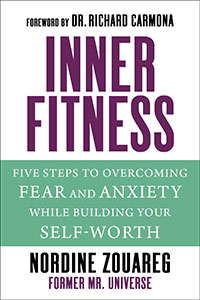By Nordine Zouareg | CONTRIBUTOR |
If you feel anxious and don’t know why, take the time to focus on something good, something or someone that makes you feel hopeful. Being optimistic or passionate about something good in your life can help ease anxiety. Sharing your perceived fears and opening up to someone you trust can help you unravel your false fears.
When people show their deepest thoughts and feelings about stressful or traumatic experiences, negative emotions such as depression and anxiety lessen and eventually disappear. Those who open up are less likely to become depressed and are less susceptible to the harmful effects of stress. That’s because they can face their fears at their own pace, in small doses and with someone they trust.
Numerous studies show that people who report a greater reliance on spiritual beliefs and who are also involved in healthy social interaction during times of stress have an emotional, mental and physical health advantage over those who do not.
Gratitude and Anxiety
“Sometimes we just need to stop thinking about what’s next and appreciate what’s here now”.

Gratitude can decrease feelings of fear and anxiety. Psychologists, Dr. Robert A. Emmons of the University of California, Davis, and Dr. Michael E. McCullough of the University of Miami, have done some extensive research on gratitude. In one study, they asked all participants to write a few sentences each week, focusing on specific topics.
One group wrote about things they were grateful for that had happened during the week. The second group wrote about daily frustrations or things that had upset them. After 10 weeks, those who wrote about gratitude were more enthusiastic and felt better about their lives. They also exercised more and had fewer visits to physicians than those who focused on sources of aggravation.
Appreciate what you have, while you are pursuing what you desire.
Managing Stress: Take Control
When you’re overwhelmed by stress, it’s difficult to stay committed to your heart’s desire, goals and even your core values. Managing your stress is important if you want to regain control. If your stress level is high, the solution should not be to seek external brain numbing tools such as binge TV watching, tobacco, alcohol, drug, food or unhealthy sex.
Seek better and meaningful behaviors that combat stress, not add to it. It’s well documented that exercise is the most powerful tool for combating stress. Do whatever it takes to get to the gym, but don’t kill yourself exercising. While exercising helps with stress, it can also add to it if you are overdoing it, as the stress of exercising can be just as harmful as stress from other sources. This happens when we’re overtraining. How much exercise is the right amount depends on the individual, but there are warnings of overtraining, and these are sure signs you’re doing too much. In fact, these are real signs of overtraining or overstressing — fatigue, elevated blood pressure, a weakened immune system, sleep problems, anxiety, depression, loss of appetite, trouble concentrating, and so on — are indistinguishable from the symptoms associated with chronic stress from other sources. Not knowing what to do or how to use gym equipment can also be a source of unnecessary stress.

Instead, be mindful, hire someone to show you the best modality and most of all, allow time for recovery. Mental and physical exercises, sleep and dietary choices are important and are most powerful when combined to reduce stress and anxiety in your life. Movement and activity offer a diversion, getting you away from the source of stress and anxiety to clear your mind and allow you to sort through the problem. Regular exercise makes you look better and feel better about yourself.
Physiological changes that occur with long-term regular activity give you more strength, endurance, and energy to cope with difficult situations. Muscular tension, which builds up throughout a stressful day, is released with aerobic activity and stretching.
“Furthermore, research has shown that exercise can reverse or improve many of the stress related health problems.”
Benefits include lower blood pressure, lower cholesterol, improved sleeping patterns and lower body fat. Moreover, according to James Blumenthal, PhD, a clinical psychologist at Duke University, exercise is generally comparable to antidepressants for patients with major depressive disorder (Psychosomatic Medicine, 2007).
Try New Things

What works for you may not work for someone else—one person may enjoy yoga, while another may feel calmer after running! Pay attention and determine what works best for you.
Here are some ideas you may want to try, in part two of this book, Rejuvenation and Recharge you will discover the different pillars of stress management I taught many clients around the world.
Other powerful and effective stress reducing tips:
Avoid stressful people and situations.
Focus on the positive.
Surrender to and embrace change.
Find a passion.
Be grateful.
Do what you love.
Try new things.
Stick with integrity.
Have more fun.
Have a good laugh
Have a good cry.
Smile often.
Know your expectations and adjust them when necessary.
Ask for help when you need it.
Connect with others.
Spend quality time with family.
Learn about mindfulness.
Meditate.
Do yoga.
Learn how to say no and delegate.
Be flexible.
Pick your battles.
Be willing to compromise.
Nurture yourself.
Spend time in nature, sit under a tree.
Manage your energy, not your time.
Trust in yourself
Listen to music.
Watch TV less.
Learn more.
Read more.
Make good love.
Express feelings instead of repressing them.
Address mental issues if you suspect them.
Mindful tips:
Taking time out when things get tense may be a great idea. I find deep and slow breathing exercises very effective to reduce stress. Here is how to do it: Breathe in slowly and deeply through the nose and breathe out through the nose. Do this for 3 minutes.
| By Nordine Zouareg, Author of the book InnerFitness Five Steps to Overcoming Fear and Anxiety While Building Your Self-Worth.’ |
 |
By Nordine Zouareg, Author of the book
InnerFitness
Five Steps to Overcoming Fear and Anxiety
While Building Your Self-Worth.’
Subscribe to get notifications about future articles.
About the Author: Nordine Zouareg – Contributor
Nordine Zouareg is the founder of Executive InnerFitness®, which for the past decade has helped thousands of overworked US Corporate Executives find work-life balance. As a former two-time Mr. Universe champion, an internationally acclaimed high-performance coach, fitness and wellness expert, author of the books Mind Over Body (Grand Central Publishing, 2007), and InnerFitness (SkyHorse Publishing, 2021), Nordine has made it his mission to provide effective and proven methods for maintaining both emotional and physical fitness. He has spent years understanding the unique pressures and stresses of working in high performance fields and has used his knowledge to help people tap into their ability for peak performance and ward off stress and emotional chaos. He draws on three decades of diverse experience in the fitness and wellness fields, including 10 years leading the revolutionary fitness program at Miraval Resort, the world-class destination spa in Tucson, Arizona.


